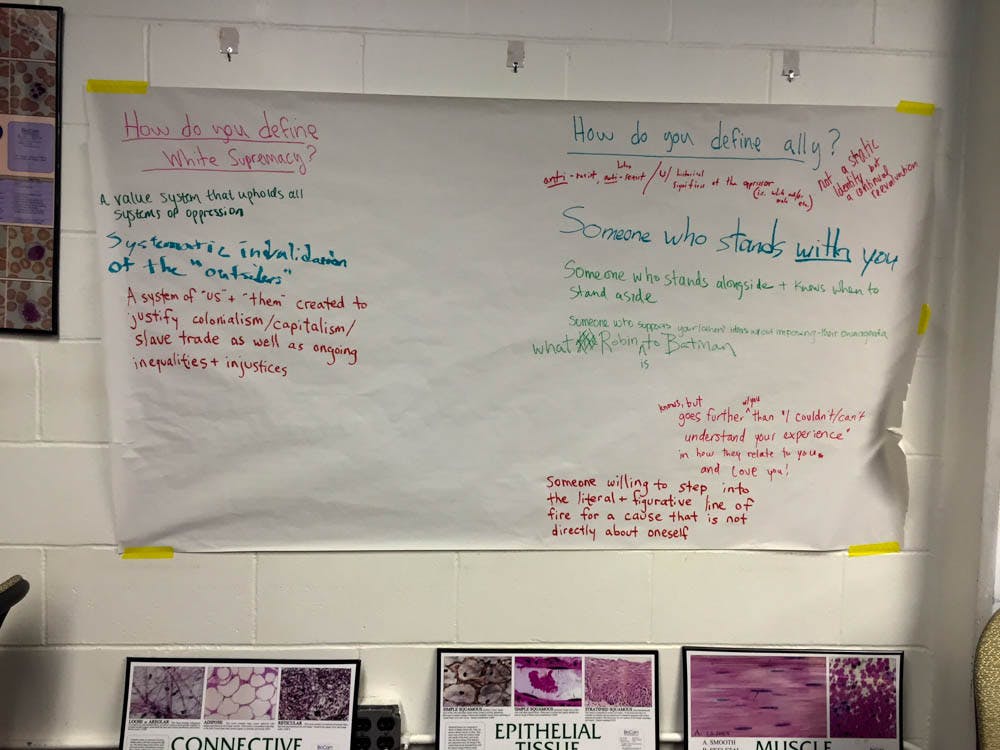The BioMedical Center played host to “White Skin, Black Asks,” a dialogue on white supremacy culture facilitated by the White Noise Collective R.I. Tuesday night.
“White Noise R.I. works at the intersection of gender oppression and whiteness to dismantle white supremacy and racism,” said Rachel Bishop ’13, a volunteer with the organization. “Our target audience is white Brown undergraduate students,” Bishop said. The event was nonetheless made public and attended by Brown and Rhode Island School of Design staff members as well as people from beyond College Hill.
Cameron Johnson ’17 invited the White Noise Collective R.I. in order to start a conversation around white racial justice mobilization under the leadership of people of color, he said. The events of last semester regarding the demands of students of color and the comparative silence of the rest of the student body showed him that “participation of white folks was paramount” to the success of the Diversity and Inclusion Action Plan, he added.
He decided to reach out to the collective, whose core membership is currently composed of white people, to facilitate a conversation centered around how white students can serve as allies to their peers in the fight for racial equality.
Bishop began “White Skin, Black Asks” with the proposal to replace the word “ally” with the word “co-conspirator” in an effort to make the term less passive. The idea of a racial justice “co-conspiracy” would allow students to feel more invested in racial justice work and begin to appreciate the intersectionality of race with other issues that white students tend to rally behind, Bishop said.
She described her experience as an environmental activist in a primarily white-dominated space at Brown. “We didn’t realize that we were missing a huge part of the conversation,” she told The Herald. “We didn’t have the capacity to name when something racist was said or done.”
The dialogue kicked off when facilitators asked participants to anonymously write down their motivations for attending the event on pieces of paper that were then crumpled up and thrown into a central pile. At the end of the exercise, participants were asked to read each others’ responses out loud.
Many attendees expressed the desire to become better people, “probably for selfish reasons as much as pure ones,” in the words of one respondent, referring to the increase in social capital one acquires at Brown for being “woke.” Others spoke of their fears of being inadvertently insensitive and invalidating. “I felt like there’s a lot of guilt here,” summarized one student.
“The biggest barrier for white students who feel woke is ‘white guilt paralysis,’” Bishop told The Herald, borrowing the term a student used in trying to explain white Brown students’ limited participation in racial equity advocacy.
RISD Museum employee Mariani Lefas-Tetenes said that the exercise left a deep impression on her. Crumpling responses allowed people to refrain from “making them precious,” but their words “were revalued through other voices,” she explained.
“It got people to really listen to each other,” Lefas-Tetenes said, adding that people were able to practice being less judgmental of each other.
Participants were asked to read the essay “White Supremacy Culture,” by Kenneth Jones and Tema Okun, before the event. After reading their reasons for coming, attendees then broke off into groups of three to discuss the essay and how it related to their own lives.
“At Brown, we get very theoretical very quickly,” Bishop said, adding that the activity was meant to re-humanize white students by making them explore their own racial identities.
Facilitators emphasized that the dialogue was not meant to provide a sense of closure on issues related to racial justice. “The point of the event is not to leave with an allyship badge, thinking ‘I can do no wrong,’” Bishop told The Herald.
In her concluding address, facilitator Ellen Tuzzolo asked all participants whether the discussions they had left them feeling uncomfortable. Looking out at the sea of raised hands, Tuzzolo wrapped up the evening with the words, “Love yourself through that discomfort.”





